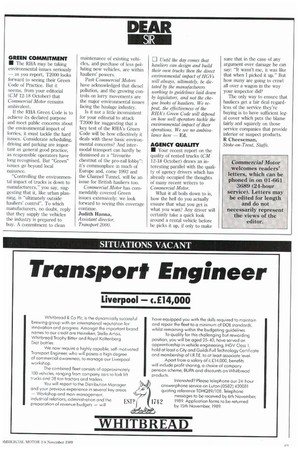DEAR
Page 63

If you've noticed an error in this article please click here to report it so we can fix it.
SIR
GREEN COMMITMENT
• The RHA may be taking environmental issues seriously — as you report, T2000 looks forward to seeing their Green Code of Practice. But it seems, from your editorial (CM 1218 October) that Commercial Motor remains ambivalent.
If the RHA Green Code is to achieve its declared purpose and meet public concerns about the environmental impact of lorries, it must tackle the hard issues. Considerate scheduling, driving and parking are important as general good practice, as responsible operators have long recognised. But "Green" issues go beyond local nuisance.
"Controlling the environmental impact of trucks is down to manufacturers," you say, suggesting that it, like urban planning, is "ultimately outside hauliers' control". To which manufacturers, no doubt, reply that they supply the vehicles the industry is prepared to buy. A commitment to clean
maintenance of existing vehicles, and purchase of less polluting new vehicles, are within hauliers' powers.
Past Commercial Motors have acknowledged that diesel pollution, and the growing controls on lorry movements are the major environmental issues facing the haulage industry.
Is it not a little inconsistent for your editorial to attack T2000 for suggesting that a key test of the RHA's Green Code will be how effectively it deals with these basic environmental concerns? And intermodal transport can hardly be dismissed as a "favourite chestnut of the pro-rail lobby": it's commonplace in much of Europe and, come 1992 and the Channel Tunnel, will be an issue for British hauliers too.
Commercial Motor has commendably covered Green issues extensively: we look forward to seeing this coverage continue.
Judith Hanna,
Assistant director, Transport 2000.
0 Until the day comes that hauliers can design and build their own trucks then the direct environmental impact of HG Vs will always, ultimately, be dictated by the manufacturers working to guidelines laid down by legislators, and not the cheque books of hauliers. We repeat, the effectiveness of the RHA's Green Code will depend on how well operators tackle the environmental impact of their operations. We see no ambivalance here — Ed.
AGENCY QUALITY
• Your recent report on the quality of rented trucks (CM 12-18 October) draws an interesting parallel with the quality of agency drivers which has already occupied the thoughts of many recent writers to Commercial Motor.
What it all boils down to is, how the hell do you actually ensure that what you get is what you want? Any driver will certainly take a quick look around a rental vehicle before he picks it up, if only to make
sure that in the case of any argument over damage he can say: "It wasn't me, it was like that when I picked it up." But how many are going to crawl all over a wagon in the way your inspector did?
The only way to ensure that hauliers get a fair deal regardless of the service they're buying is to have sufficient legal cover which puts the blame fairly and squarely on those service companies that provide inferior or suspect products. R Cheeseman, Stoke-on-Trent, Staffs.


























































































































































